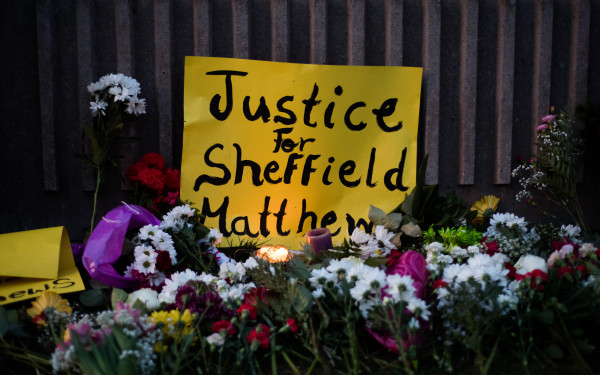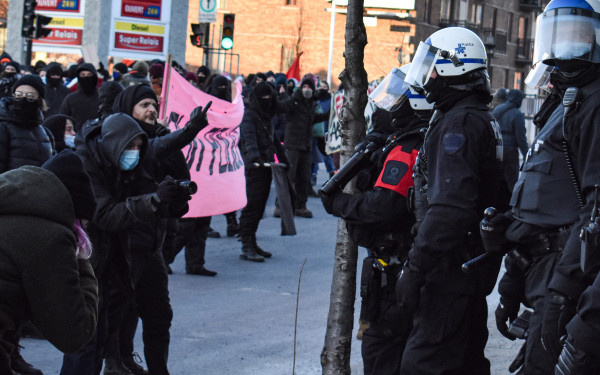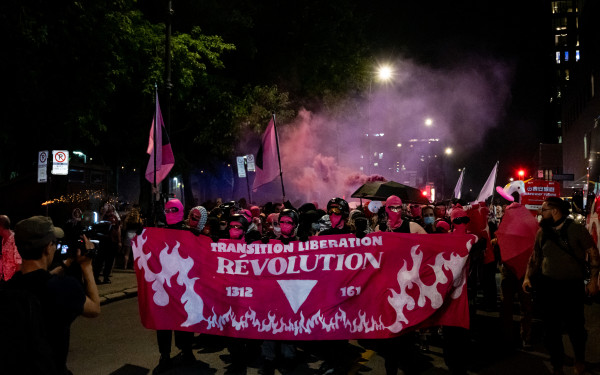Editorial
On Brutal Repression by the SPVM
It began as most Anti-Police Brutality protests do.
Demonstrators grew in numbers at a meeting place on March 15, this year facing the Service de police de la Ville de Montréal station at Place-des-Arts. There was heavy police presence, there were some people wearing masks and others distributing pamphlets. The usual chants of “No justice, no peace, fuck the police!” filled the air.
But that’s when things took a new turn—police moving in to block off all exits from the square. A handful of people were violently pulled from the crowd and arrested before anything happened.
An announcement was made—the demonstration had been declared illegal under a municipal bylaw which requires an itinerary be provided for any demonstration, but protesters were told they were permitted to march without police intervention, provided they marched with traffic.
At 5:22 p.m., the march began. At 5:23 p.m., Sûreté du Québec and SPVM officers swept in and began dispersing demonstrators. They had marched roughly half a block.
The annual protest has a history of getting out of hand—15 out of the last 17 have erupted into violence and resulted in vandalism and mass arrests numbering in the hundreds.
But this year was different—demonstrators were given no chance to show that they could be peaceful. Police intervened immediately rather than allowing demonstrators to voice their message.
A single police car was vandalized and two store windows broken, which are not insignificant—but are also not reason enough to kettle, pepper-spray, tear gas and arrest close to 300 protesters, many of whom had done nothing violent whatsoever.
They were detained for simply showing up.
Friday’s protest did little more than demonstrate why there is a need now, more than ever, to voice concerns about police brutality. Police were aggressive, showing excessive force on numerous occasions when making arrests.
In contrast, protesters showed minimal amounts of violence and, short of yelling at police, the majority never really engaged in anything aggressive at all. If it isn’t possible to protest against police brutality without police provoking violence, how are things going to get any better?
Maybe they were trying to show off; agents from several Ontario and Quebec police forces were there to observe the brutality.
Kettling, a tactic frequently employed by Montreal police, was used heavily on March 15. It’s the practice of making a wide perimeter and moving in—trapping anyone caught inside for hours at a time, and ending in mass arrests.
To put things in perspective, following the 2010 G20 riots in Toronto, city police there said they would abandon the tactic, noting that it violates Section 9 of the Canadian Charter of Rights and Freedoms, a section which guarantees the right of individuals against arbitrary detention and imprisonment.
The Canadian Civil Liberties Association has also denounced the tactic, calling it unconstitutional. The kettling that occurred in London in 2009 during the G20 summit there has been ruled illegal by the British High Court of Justice, who decided that those who were kettled could sue for false imprisonment.
Despite all of this, on March 15, Montreal police kettled groups of people seemingly at random, scooping up many passersby who played no role in the protest.
Why have Montreal police yet to abandon this controversial and, quite frankly, unconstitutional tactic?
Is an exercise of muscle-flexing going to make anyone stop protesting?
In years past, neither party has been without blame, like last year when rocks were thrown at police before things escalated into a riot.
This year, however, it’s not on the protesters to justify vandalism or rioting. This year, it’s on police to justify the mass arrest of nearly 300 individuals after less than five minutes of actual demonstrating, all of which was peaceful.
Trying to snuff out protests before they happen only galvanizes the cause—especially when it’s exactly the kind of misuse of power people are protesting against.

(WEB)_900_450_90.jpg)


_600_375_90_s_c1.jpg)


